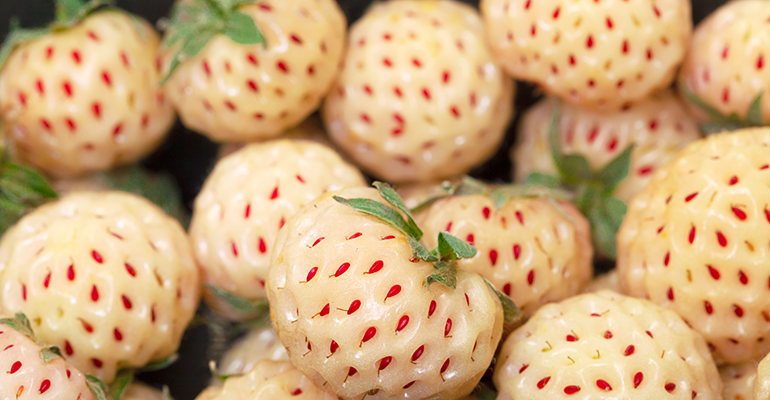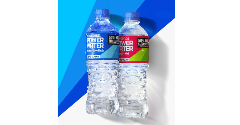News
‘Reverse’ strawberries & nootropic kale: How brands are adding value to fresh produce
3 Feb 2023
UK supermarket M&S has launched ‘reverse’ White Pearl strawberries while Singapore vertical farm Sustenir is growing kale that contains GABA, a nootropic that promotes calmness and mental wellbeing.
New product development and innovative launches are usually associated with packaged food and drink products. However, two recent product launches demonstrate how innovation can happen in the fresh produce aisle too.

UK retailer Marks & Spencer (M&S) launched White Pearl strawberries in January. The berries have a white base colour even when ripe but are sweet like red strawberries with flavour notes of pineapple and vanilla. They look like “typical strawberries in reverse”, said M&S on its Instagram account.
Tom Pedley, M&S strawberry buyer said: “We love to be first to market and introduce products that no one else can. Our customers get really excited when we introduce new flavour produce or hybrids.
The private label retailer’s fresh produce range also includes small kiwi berries, candyfloss grapes, and limelon, a variety of melon that has lime flavour notes.
Calming kale: A leafy green high in a natural nootropic
Meanwhile, Singapore vertical farm Sustenir launched a version of its Toscano kale that has high levels of healthy gamma-aminobutryic acid (GABA), a neuro-transmitting compound that inhibits certain brain signals and promotes feelings of calm.
Nootropics such as L-theanine and GABA are linked to enhanced brain power, focus and alertness.
One 28-gram serving of its Toscano GABA kale contains three times more vitamin B9 (folate) than a serving of peanuts, it says.
Sustenir grows its produce in indoor, controlled environments without the use of pesticides and, according to the company, its products use 95% less water and generate 92% fewer carbon emissions than produce imported to Singapore.
According to Sustenir’s CEO, Jack Moy, the company is playing its role in addressing high levels of stress among Singaporeans.
“...we [...] certainly do our role in the city by growing superfoods,” he said in an online post. “We are just scratching the surface, and there is amazing potential [for] controlled environment agriculture in improving healthspans and promoting wellness. For starters, our role in the city also extends to inspire consumers to eat healthier by having more greens on their plates.”
High interest in novel varieties and functional attributes
In 2022, US fresh produce trade association, the Southeast Produce Council (SEPC), commissioned an online survey that questioned 1,500 US consumers about their preferences and perceptions of fresh produce.
It found that consumers were particularly interested in novel varieties and sizes, such as one-portion cauliflowers or mini avocados. Almost half (46%) were interested in fresh fruits and vegetables that have added functional benefits, such as extra levels of vitamin C, longer shelf life, or tear-free onions.
David Sherrod, president and CEO of SEPC, said such products resonated more with younger generations. “Boomers are much more likely to think this is a little too sci-fi but 54% of Gen Z who grew up in a world of package claims and call-outs like the idea.”
Nearly half of consumers want longer lasting fruit and veg
The SEPC survey also found that 46% US consumers were interested in solutions to extend shelf-life and reduce household waste.
Industry innovators are developing such solutions for both fresh produce packers and consumers. Bio2Coat, for instance, is a Portuguese startup that produces edible natural coatings to extend the shelf-life of fruit and vegetables. Its solution, for which it won a prize in the Fi Global 2022 Startup Innovation Challenge, can also be used to produce edible, sustainable packaging.
On the consumer-facing side, Naturpod is a Spanish company producing ethylene-absorbing envelopes that, when placed in the fridge, absorb the ethylene emitted by fruit and vegetables – the enzyme that causes the ripening process - and extends the shelf life. The envelopes last for around one month and are made from sustainable, eco-friendly materials that are 100% compostable and can be safely disposed of after use.
Related news

Oat Barista: Innovation for game-changing beverages
20 Nov 2025
Oat Barista is a clean label, sustainable, and innovative drink base specifically designed to create the perfect foam in one single ingredient.
Read more
How younger consumers are redefining ingredient choices and rejecting brand loyalty
18 Nov 2025
Gen Z and millennial consumers’ preferences for transparency, functionality, and purpose are “redefining the very nature of consumption itself”, says SPINS.
Read more
Hybrid formats and flexible positioning to disrupt category norms in 2026
17 Nov 2025
Trend forecasters expect food and drink to move more fluidly across occasions, functions, and formats as consumers seek versatility, novelty, and convenience.
Read more
Danone highlights digestive health as potential ‘tipping point’ for food industry
13 Nov 2025
Danone is betting on a food industry “tipping point” that will bloat the market for healthy products, particularly those related to gut health.
Read more
New UPF standard hoped to offer consumers ‘coherence and clarity’
10 Nov 2025
Ingredients companies are being urged to enter “a new era of partnership and innovation” following the launch of the industry’s first non-UPF verification scheme.
Read more
Faravelli at Fi Europe: Showcasing FARA® functional solutions for food and nutra
28 Oct 2025
At Fi Europe 2025 in Paris (stand 72M39), Faravelli showcases FARA® Customized Functional Solutions and a wide ingredient portfolio for food and nutra – delivering quality, innovation, and expertise.
Read more
Agrigum Redefined FIBER
27 Oct 2025
Agrigum has transformed gum acacia into a natural, science-backed fibre that supports gut health, sustainability, and innovation across global food and nutrition applications.
Read more
Expanding boundaries in food & beverage innovation
23 Oct 2025
IMCD and FrieslandCampina Professional expand partnership to deliver Kievit® across EMEA, enabling brands to enhance quality and accelerate time-to-market for tomorrow’s food & beverage creations.
Read more
Amazon Grocery launch aims to balance quality with affordability
22 Oct 2025
Global e-commerce giant Amazon has introduced a new private-label food brand, combining existing Amazon Fresh and Happy Belly products with new everyday items.
Read more
Powerade enters hydration space with launch of Power Water
21 Oct 2025
Coca-Cola’s Powerade brand has launched a zero-sugar, electrolyte-enhanced functional water, marking the brand's entry into the hydration space.
Read more